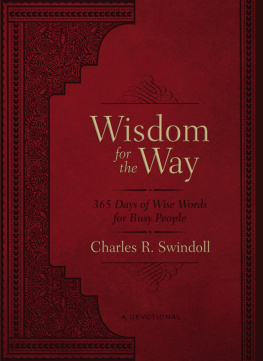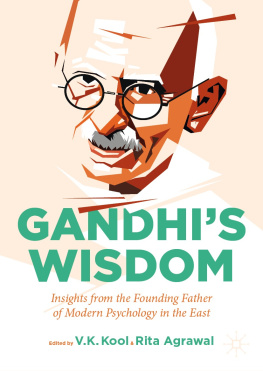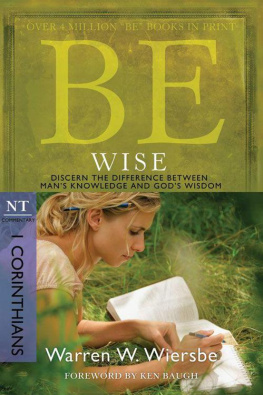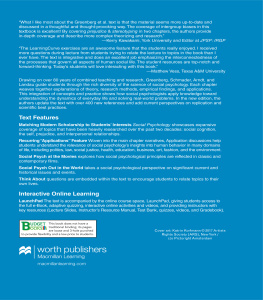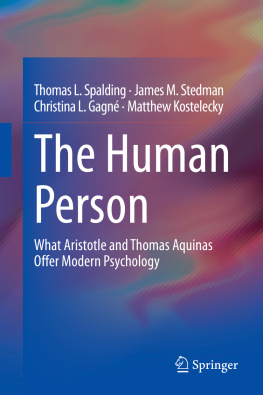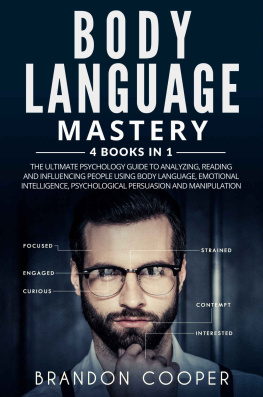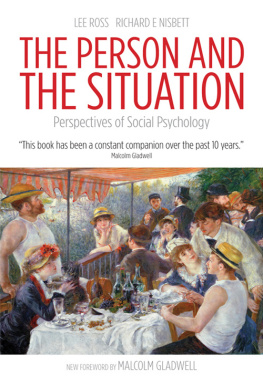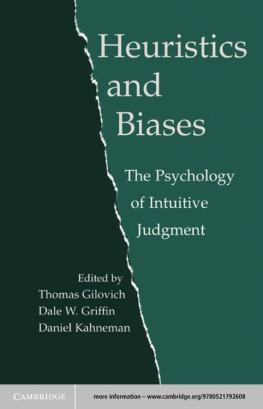Thank you for downloading this Free Press eBook.
Join our mailing list and get updates on new releases, deals, bonus content and other great books from Free Press and Simon & Schuster.
C LICK H ERE T O S IGN U P
or visit us online to sign up at
eBookNews.SimonandSchuster.com
We hope you enjoyed reading this Free Press eBook.
Join our mailing list and get updates on new releases, deals, bonus content and other great books from Free Press and Simon & Schuster.
C LICK H ERE T O S IGN U P
or visit us online to sign up at
eBookNews.SimonandSchuster.com
ALSO BY THOMAS GILOVICH
How We Know What Isnt So: The Fallibility of Human Reason in Everyday Life
Why Smart People Make Big Money Mistakes: Lessons from the Life-Changing Science of Behavioral Economics
(with Gary Belsky)
Heuristics and Biases: The Psychology of Intuitive Judgment
(with Dale Griffin and Daniel Kahneman)
Social Psychology
(with Dacher Keltner, Serena Chen, and Richard Nisbett)
ALSO BY LEE ROSS
Human Inference: Strategies and Shortcomings of Social Judgment
(with Richard Nisbett)
The Person and the Situation: Perspectives of Social Psychology
(with Richard Nisbett)
Barriers to Conflict Resolution
(with Kenneth Arrow, Robert Mnookin, Amos Tversky, and Robert Wilson)

FREE PRESS
An Imprint of Simon & Schuster
1230 Avenue of the Americas
New York, NY 10020
www.SimonandSchuster.com
Copyright 2015 by Thomas Gilovich and Lee Ross
All rights reserved, including the right to reproduce this book or portions thereof in any form whatsoever. For information address Free Press Subsidiary Rights Department, 1230 Avenue of the Americas, New York, NY 10020
First Free Press hardcover edition December 2015
FREE PRESS and colophon are registered trademarks of Simon & Schuster, Inc.
For information about special discounts for bulk purchases, please contact Simon & Schuster Special Sales at 1-866-506-1949 or .
The Simon & Schuster Speakers Bureau can bring authors to your live event. For more information or to book an event contact the Simon & Schuster Speakers Bureau at 1-866-248-3049 or visit our website at www.simonspeakers.com.
Jacket design by Jaime Keenan
Jacket photographs: Hand Joho/Getty; Bulb Davies and Starr/Getty
Library of Congress Cataloging-in-Publication Data
Gilovich, Thomas
The wisest one in the room : how you can benefit from social psychologys most powerful insights / Thomas Gilovich and Lee Ross.
pages cm
1. Insight. 2. Human behavior. 3. Social psychology. I. Ross, Lee. II. Title.
BF449.5.G55 2015
302dc232015018053
ISBN 978-1-4516-7754-6
ISBN 978-1-4516-7756-0 (ebook)
For Richard Nisbett
CONTENTS
PREFACE
I n late spring 1944, Allied forces were making final preparations for the momentous events of D-Day, the landing of troops on the five beaches of Normandy, code-named Utah, Omaha, Gold, Juno, and Sword. The invasion would take place in two phases: an assault by twenty-four thousand British, American, and Canadian airmen shortly after midnight and a massive amphibious landing of Allied infantry and armored divisions at 6:30 a.m. The British commander, General Bernard Montgomery, gave the officers who would lead the assault their final briefinga tour de force performance, thorough in its content and impeccable in its delivery.
The Supreme Allied commander, General Dwight D. Eisenhower, known to all as Ike, had assigned this task to Monty and did not do much talking himself in the final hours before the invasion. He did not reiterate details about the operation. Nor did he offer his own perspective on the larger significance of the operation or of the long struggle aheada struggle that would culminate in the defeat of the Third Reich. He simply walked around the room shaking hands with each and every man who would lead the assault, mindful, as they were, that many would not survive.
He recognized that their thoughts would be focused on the challenge that each of them would face in the next twenty-four hours, on the fates of their comrades-in-arms, and on the well-being of their families. He gave no hint that he was contemplating his own fate or future reputation. His wordless handshakes communicated to each
Words of wisdom are easy to find. They are offered in books of quotations, desktop calendars, daily planners, and even bumper stickers. Advice is given to us, often unsolicited, by friends, relatives, and colleagues. We can look to sages for counsel about how to manage our personal finances ( Neither a borrower nor a lender be. William Shakespeare) or how to proceed in our careers ( Be nice to those on the way up; theyre the same folks youll meet on the way down. Walter Winchell). People who aspire to power can seek guidance from a Renaissance Italian diplomat ( It is wise to flatter important people. Niccol Machiavelli), and those who have the more modest goal of winning friends and influencing people can find similar advice from a bestselling twentieth-century author ( Be lavish in praise. Dale Carnegie) or a U.S. National Medal of Freedom winner ( People will forget what you said, people will forget what you did, but people will never forget how you made them feel .Maya Angelou).
Were given guidance about how to achieve our goals ( The best way to get what you want is to deserve what you want. Charles Munger) and, from the Sufi poets of old, advice about how to deal with difficult times ( This too shall pass ). We can even find all-encompassing prescriptions for the meaning of life and the path to personal fulfillment ( The meaning of life is to find your gift; the purpose of life is to give it away ) from sages whose names have been lost to us.
Insight and skill in dealing with human conflict have long been seen as particularly important elements of wisdom. We see this in the Old Testament tale of King Solomon resolving a custody battle and in the success of Nelson Mandela, two and a half millennia later, in achieving a bloodless end to apartheid.
There are many different kinds of wisdom, as these quotations attest. Some people are Buddha wise, others Bubba wise, and still others Buffett wise. It is telling that Websters dictionary distinguishes three types of wisdom: (1) knowledge , or accumulated philosophic or scientific learning; (2) insight , or the ability to discern inner qualities and relationships; and (3) judgment , or good sense.
This emphasis on discernment and good sense highlights the fact that being wise is not the same thing as being smart. By the wisest one in the room we do not mean the person with the highest IQ or the greatest command of facts and figures. The smartest one in the room may lack insight about human affairs and display poor judgment in both day-to-day interactions and the larger pursuit of a rewarding and meaningful life. Indeed, The Smartest Guys in the Room is an account of the people at the top of Enron, the failed energy corporation, who by all accounts were extremely smart and very sophisticated in their financial manipulations. But their arrogance, greed, and shortsightedness got the better of them (as well as their companys employees and shareholders), making it clear that they were anything but wise. What they lacked was not just a moral compass, but wisdom about what goals are truly worth pursuing and the means by which they are best pursued.
A critical difference between wisdom and intelligence is that wisdom demands some insight and effectiveness around people. Intelligence does not. A person can be smart without being smart about people, but it makes no sense to say someone is wise if the person has no feel for people or no understanding of their hopes, fears, passions, and drives. You can be a savvy investor or an accurate weather forecaster even if you arent particularly savvy about people, but you cant be a wise person if you arent wise about people. Montgomerys preinvasion briefing may have been more intelligently crafted and more skillfully delivered than any that Eisenhower ever gave. But it was Ikes understanding of the needs of his officers, and his deftness in attending to those needs, that testify to his wisdom.
Next page

